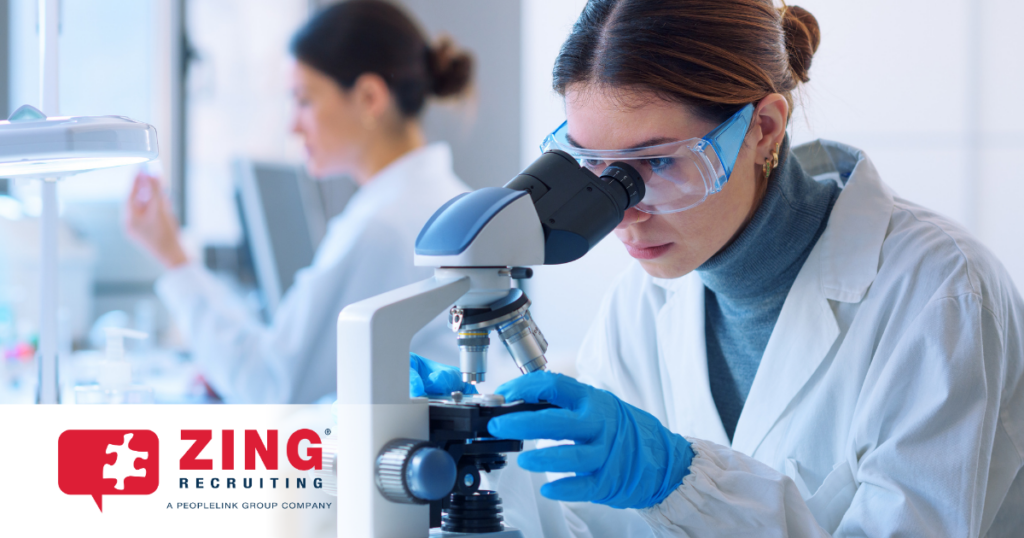Blog
The Growing Demand for Skilled Professionals in Specialty Chemicals and Pharmaceuticals
The specialty chemicals and pharmaceutical industries are booming, and with that growth comes a major challenge—finding enough skilled professionals to keep up. Industry expansion, new technologies, and an aging workforce are all driving demand for talent. Companies that want to stay ahead need to tackle these hiring challenges head-on.
What’s Driving Industry Growth in Specialty Chemicals and Pharmaceuticals?
Both industries are seeing steady growth, thanks to rising global demand, shifting regulations, and constant innovation. Increased investment in R&D, particularly in biologics and sustainable chemicals, is accelerating the need for specialized talent. Additionally, stricter environmental and safety regulations are pushing companies to develop new processes, requiring a workforce with advanced technical expertise. As new challenges emerge, businesses are evolving to meet them, but they need the right people to make it happen.
Rising Demand for Innovation and Sustainability
Across the board, companies are looking for high-performance, sustainable solutions. Specialty chemicals are playing a bigger role in industries like automotive, electronics, and personal care, with a push toward eco-friendly alternatives. Meanwhile, pharma companies are working on cutting-edge therapies, precision medicine, and biologics to treat complex diseases.
Evolving FDA guidelines are pushing pharma firms toward advanced research and quality control, requiring stricter compliance measures and more specialized expertise. As a result, companies must invest in talent that can navigate regulatory complexities.
Technological Advancements Are Changing the Game
To stay competitive, both industries are doubling down on new technology. Here are some of biggest trends:
- AI and Machine Learning – AI is speeding up everything from chemical formulation to drug discovery and manufacturing. In pharma, it’s also helping design better clinical trials and improve patient outcomes.
- Automation and Robotics – More companies are automating production to boost efficiency, reduce errors, and maintain quality. Robotics are streamlining workflows and making processes more precise.
- Digital Manufacturing and Data Analytics – Tools like digital twins, real-time monitoring, and predictive analytics are helping companies optimize production and supply chains.
- Biotech and Advanced Materials – Biopharmaceuticals and gene editing are transforming drug development, while specialty chemicals are seeing innovations like nanotechnology and bio-based polymers.
- Sustainability and Green Chemistry – Eco-friendly raw materials, waste reduction, and energy-efficient production are becoming standard. Specialty chemicals and pharma companies alike are rethinking their processes to be more sustainable.
The Talent Shortage is a Growing Concern for both Specialty Chemicals and Pharmaceuticals
As the specialty chemicals and pharmaceutical industries continue to evolve, the demand for skilled professionals is reaching new heights but finding and keeping that talent isn’t easy. The aging workforce, skill gaps, and shifting career interests are all making it tougher to hire.
Specialty Chemicals Industry:
- Job Outlook: The U.S. Bureau of Labor Statistics (BLS) projects an 8% growth in employment for chemists and materials scientists from 2023 to 2033, outpacing the average for all occupations. This shows just how essential these roles are to innovation and industry growth.
- Aging Workforce: The chemical industry faces demographic challenges, with a significant portion of its workforce approaching retirement. This trend underscores the urgency for succession planning and the recruitment of new talent to fill impending vacancies.
Pharmaceutical Industry:
- Recruitment Challenges: The pharmaceutical sector is grappling with workforce shortages. Interest in pharmacy careers has declined sharply, with pharmacy school applicants dropping by over 35% in the past decade, according to the American Association of Colleges of Pharmacy.
- Digital Skills Demand: As AI and digital tools become more central to drug development, companies need professionals who understand these technologies. A recent survey found that 49% of respondents identified skills shortages as a barrier to digital transformation in pharma, up from 43% the year before.
What’s Being Done to Close the Gap?
Companies aren’t sitting back and waiting—they’re investing in solutions. For example, Eli Lilly announced plans to invest $27 billion in building four new manufacturing plants across the United States, potentially creating 3,000 high-skilled jobs. Such initiatives aim to bolster domestic manufacturing capabilities and bring in much-needed talent.
Strategies to Bridge the Talent Gap:
- Educational Partnerships: Collaborations between industry and educational institutions can align curricula with industry needs, ensuring graduates possess relevant skills.
- Upskilling and Reskilling: Upskilling current employees in areas like digital tech and advanced manufacturing can fill skills gaps from within.
- Attracting Diverse Talent: Implementing inclusive recruitment strategies can tap into a broader talent pool, bringing in fresh perspectives and much-needed skills.
- Promoting STEM Careers: Encouraging interest in science, technology, engineering, and mathematics (STEM) from an early age can build a robust pipeline of future professionals.
Building the Skilled Workforce You Need for the Future
Hiring in specialty chemicals and pharmaceuticals is more competitive than ever, but the right talent is out there. At Zing Recruiting, we specialize in connecting companies with highly skilled professionals who can drive innovation and keep your business moving forward. Whether you need experts in R&D, manufacturing, or regulatory compliance, we’re here to help. Let’s work together to build the workforce you need for the future. Get in touch today!
